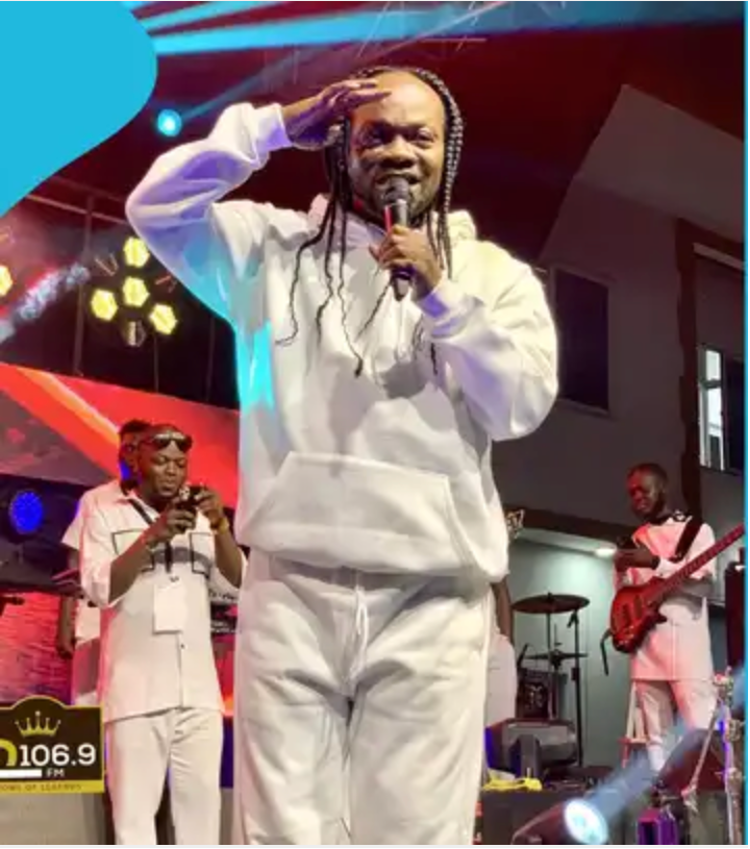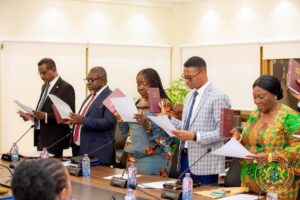
Photo: Late Charles Kwadwo Fosu
• Presidents, Stars and Fans Pay Tribute to Music Icon
Charles Kwadwo Fosu, widely known by his stage name Daddy Lumba, has died at the age of 60. The iconic highlife musician passed away on Saturday, July 26, 2025, after a short illness, prompting an outpouring of tributes from across Ghana’s political, cultural, and artistic spectrum.
Long revered as a transformative figure in Ghanaian music, Lumba’s passing has left a profound void, with many describing it as the end of a golden era.
Political Class Pays Respects
President John Dramani Mahama led national tributes, describing Lumba as “a musical genius whose work defined generations.”
“The beats to his memorable songs may have died down, but his enduring legacy will echo through the ages.”
Former President Nana Addo Dankwa Akufo-Addo reflected on Lumba’s influence, calling him “a pantheon among musical greats,” and credited his music for shaping the emotional mood of his political journey.
“His hit-making songs will remain lasting contributions to my presidential journey.”
Former Vice-President Dr Mahamudu Bawumia echoed similar sentiments, describing Lumba as “a pillar in Ghana’s highlife genre,” and noting that his death was “a huge blow… not only to the music fraternity but to the entire country.”
From Studio to Stage: Tributes from Musicians
Leading figures in Ghana’s music industry have been vocal in their grief. Award-winning rapper Sarkodie took to social media to honour the highlife legend.
“Only if I had the words to express how I’ve been feeling… since early this morning… RIP DL!!! Thanks for all you’ve done for us… The legacy lives on.”
Contemporary artists such as Kofi Kinaata, M.anifest, Kweku Flick, and long-time collaborator Ofori Amponsah also paid their respects, citing Lumba’s mentorship and artistic influence as central to their own careers.
Civil Society and Institutional Tributes
The Movement for Change described Lumba as a “cultural colossus” whose music offered Ghanaians a powerful sense of self.
“Legends never truly leave us; their voices live on in every note we play and every heart they moved,” the group said in a statement, urging the public to honour Lumba’s legacy by embracing authenticity and artistic bravery.
Cultural Reflections
Writing in a moving editorial, cultural commentator Francis Doku noted that Lumba “now ascends to the realms of immortals,” joining the ranks of highlife icons such as Nana Ampadu and C.K. Mann.
“Our songs are soundtracks to weddings, heartbreaks, and national celebrations. Lumba sang our lives.”
He praised the artist’s ability to blend tradition with innovation, noting that Lumba’s career spanned multiple decades and bridged generations.
Themes Emerging in the National Mourning
Theme Summary
End of an Era: Widely seen as a defining voice of Ghana’s emotional and musical life.
Legacy of Mentorship: Recognised as a father figure to many younger musicians.
Cultural Identity: His work transcended music, reflecting Ghana’s aspirations and soul.
National Unity Tributes came from across political and ideological divides.
A Towering Musical Catalogue
Daddy Lumba’s discography spans over 30 studio albums, earning him multiple Ghana Music Awards, the Artist of the Year honour, and a Lifetime Achievement Award from EMY Africa. His music, a rich blend of love ballads, social commentary, and highlife rhythms, remains deeply embedded in Ghana’s collective memory.
A Voice That Will Never Be Silenced
From Accra to Kumasi, Takoradi to Tamale, tributes continue to flood in—testimony to Lumba’s unmatched cultural footprint.
While his voice has fallen silent, his melodies remain eternal, resonating from radios, wedding receptions, and living rooms across the nation. For many, Daddy Lumba was not merely an entertainer, but a guardian of memory, emotion, and identity.






